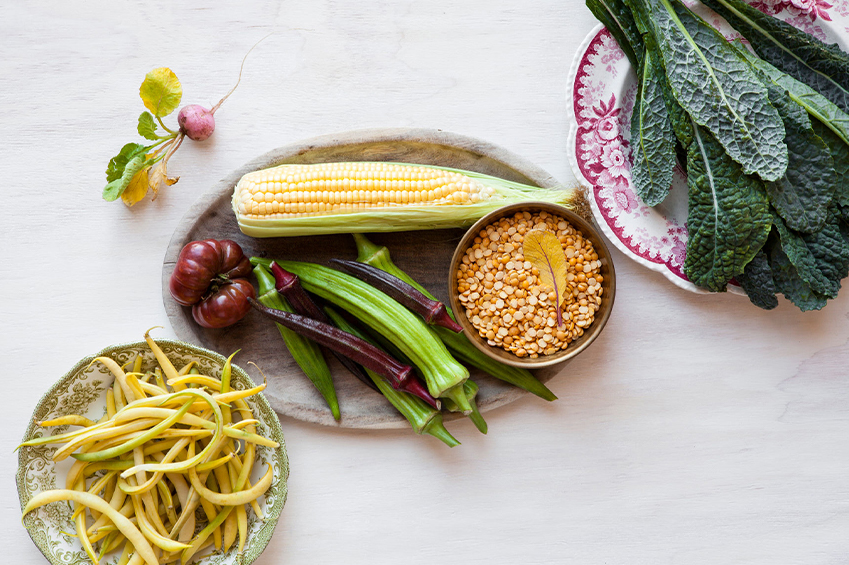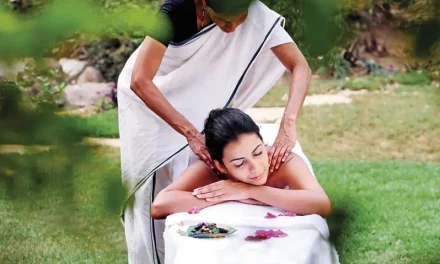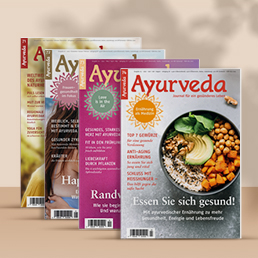The holistic approach of Ayurveda
Our immune system bears a great responsibility. Since we are constantly exposed to a wide variety of external influences in a busy environment, a good immune defence is essential for survival. It plays a crucial role in maintaining our well-being and decisively determines our lifespan and the ageing process. The immune system watches over our health, distinguishes harmless from dangerous stimuli, protects us from the invasion of microorganisms or pathogens, decides on tolerance or attack and recognises tumour cells and destroys them. Although immunological research in Germany has a long tradition with more than 150 research departments and has already produced five Nobel Prize winners on the subject of immunology, many questions surrounding the causes of immune disorders and their best possible treatment remain unanswered to this day.
Very different in Ayurveda
Here, numerous measures for increasing the immune power were already described in detail over 2,000 years ago. The core goal of Ayurveda is Ayus, i.e. longevity, with the best possible physical and mental health. To achieve this goal, we need strength (Bala) and a healthy essence (Ojas = finest product of a perfect metabolism) to resist or overcome diseases. Both, Bala and Ojas, are on the one hand constitutionally innate and on the other hand individually acquired and thus influenceable. This is where the Ayurvedic prevention and healing concepts come in. Bala and Ojas are protected by a healthy lifestyle and restored or specifically increased by regenerative therapies of Ayurveda.
To understand the immune system Ayurvedically, we need to think holistically. Its condition reflects the balance of body, senses and mind, which influence each other. Ayurvedic immunology therefore always works multimodally using all therapeutic methods.
The immune system from a western perspective
In Western immunology, a distinction is made between an innate-nonspecific and an acquired-specific immune system. Both work closely together:
The innate immune system
The innate immune system is also called the resistance system and is the first line of defence against most potential pathogens. This includes closed skin and intact mucous membranes. If pathogens nevertheless enter the body, various defence cells ensure that the invaders are rendered harmless.
The acquired immune system
The acquired immune system is characterised by two important features: Specificity and memory. Specificity refers to the adaptability of the immune system. The body’s own defence system is able to recognise specific structures of the invaders, targets these antigens and forms suitable antibodies that render the attackers harmless. Memory means that the immune system remembers pathogens once they have invaded and can activate the specially formed antibodies more quickly should a new infection with the same microorganism occur. An intelligent system that is constantly evolving and can react more specifically and quickly to already known attackers than the innate defence system.
In a figurative sense, Ayurvedic measures strengthen the functions of the innate immune system and promote the qualities of the acquired immune system.
Healthy gut = healthy immune system
Particularly interesting is the increasing knowledge about our gut-associated lymphoid tissue (GALT) immune system. It is quantitatively the largest immune organ in our body and houses 70-80% of all antibody-producing cells. The GALT protects our intestinal mucosa from the invasion of harmful microorganisms and at the same time prevents overreactions to harmless foreign substances that come into contact with the intestinal wall through food intake. An important function with regard to the prevention of allergies.
A healthy intestinal barrier consists of an intact mucous membrane, bacterial flora and various antibodies. It is in active exchange with the immune system and, in addition to digestion and nutrient utilisation, is also responsible for defence performance. If we damage our intestinal flora through a low-fibre diet, too much alcohol, medication, intestinal infections or chronic stress, the protective function of our intestinal barrier decreases. The intestine becomes permeable, inflammations and undesirable immune reactions can develop.
The immune system from an Ayurvedic perspective
Bala means power or strength and in Ayurveda is representative of our immune power. Bala is defined as the capacity of tissues to grow and resist stress and disease.
Ojas is the finest essence of a perfect metabolism. When our body tissues have been formed in high quality and quantity, ojas is created. Ojas is the material expression of Bala. Constitutionally, Bala and Ojas are related to healthy Kapha. This is why Kapha-dominated constitutions have the strongest immune system. If, on the other hand, Kapha increases pathologically in the context of overeating, respiratory infections can develop and the immune power decreases.
Pitta-dominated constitutions have a moderately strong immune system and are prone to infections or allergies of the skin as well as inflammatory processes.
Vata constitutions need to be mindful of their strength, as they tend to have weak immune systems. Nutritious food, regular and sufficient sleep as well as mental hygiene to improve stress management are of great importance for them.
The four most important immunologically induced disorders from a western perspective are
| Susceptibility to infection | The immune system is too weak. |
| Allergies | The immune system overreacts to a harmless stimulus. |
| Autoimmune diseases | The immune system fights the body’s own structures and functions. |
| Oncological diseases | The immune system does not prevent cancer cells from multiplying unhindered. |
In classical Ayurveda we find a similar classification
| Ojakshaya | Comparable to immune deficiency. The immune system is strengthened therapeutically through regenerative procedures. |
| Ojavyapat | Comparable to immune defects and allergies. Therapeutically, the focus is on correcting the excessive immune response. |
| Ojavisramsa | Comparable to autoimmune diseases. Therapeutically, ojas are rebuilt via the path of systemic cleansing and sustainable regeneration. |
Ayurvedic therapies to strengthen the immune system
Ayurvedic body therapy procedures are divided into two groups: On the one hand, there are the palliative measures, which include dietary optimisation, lifestyle changes and taking nutritional supplements, and on the other hand, cleansing measures, which are divided into external and internal cleansing.
The ouintet for a powerful immune system
All in all, there are five key areas to which we should pay attention. If we integrate healthy measures here and ensure mindfulness, our immunity will benefit.
Nutrition
Fresh, mindfully prepared and well-digested food builds up the body’s tissues, promotes Bala (strength) and leads to the formation of immune-boosting Ojas (essence of a healthy metabolism). Cereals, vegetables and pulses are recommended as staple foods in Ayurveda. Fruits, nuts, dairy products, sweeteners (sharkara and honey), oils, fats and spices are used in addition. Fish and meat are integrated only as needed and in moderation.
Consume two to three main meals a day with an interval of four to eight hours. Consistently avoid snacks in between in order to digest the previous meal in the best possible way. Ayurvedic meals are mainly warm and freshly cooked. Raw vegetables in the form of salads or fruits are served as a side dish and should ideally be eaten mainly during the midday hours.
If you opt for a three-meal system with four to six hours between meals – for example, 8am-1pm-6pm, I recommend skipping dinner twice a week. This intermittent fasting, in which you eat no calories for 18 hours from 2pm until 8am the next morning, protects against age-related immune system disorders. Drink about two litres a day, at least half of which should be pure, low-mineral water. In winter, drinks should be consumed warm, and in summer they should be served at room temperature.
Lifestyle
Important elements of lifestyle change to strengthen the immune system are:
- the promotion of a healthy sleep architecture
- learning conscious breathing techniques
- daily exercise to balance our predominantly sedentary lifestyle
- healthy interaction with analogue and digital sensory stimuli
- Developing a healthy rhythm without time pressure and excessive demands.
Depending on the constitution, I recommend six to eight hours of sleep daily in the best possible external conditions. Less than six hours of sleep increases vata dosha, more than eight increases kapha dosha. In both cases, weakening of immunity can be a possible consequence.
Conscious, deep breathing through the nose reduces the susceptibility of the upper airways to infection and reduces our susceptibility to stress, which in turn can weaken the immune system. You can learn good techniques in yoga classes or Ayurvedic practices.
Divide your exercise programme into three groups: Endurance, Strength and Flexibility. Exercise endurance (running, cycling, rowing, cross trainer) and strength (free training or guided on equipment) twice a week. Add flexibility and coordination through yoga or Pilates every day. As a rule of thumb, it is better to do 30 to 60 minutes a day than two to three hours at the weekend. Try out how you can best integrate sport into your everyday life.
Define daily low-stimulus times when all reception devices remain switched off and you focus your attention inwards. Rhythmise your day and divide the 16 to 18 waking hours realistically in order to meet all professional and private obligations on the one hand and at the same time have hours for your personal health routine, rest and leisure as well as valuable social contacts. Plan a daily morning routine to prevent infections. This includes drinking a quarter to a half litre of hot water, removing tongue coatings with a tongue scraper, oil mouthwash and applying two to three drops of Ayurvedic nasal oil to each nostril. If needed and susceptible, you can also do steam inhalation with respiratory clearing plants like Ajwain.
Ayurvedic Supplements
Ayurveda knows a variety of immune-modulating plants that can both dampen overstimulated reactions and increase the body’s defences. These include the long pepper Pippali (Piper longum), Guduchi (Tinospora cordifolia), Ashwagandha (Withania somnifera), Amalaki (Emblica officinalis) and Tulsi (Ocimum sanctum). The selection is made individually based on your constitution and current immune status.
The famous Chyavanprash is a real jack-of-all-trades for our immune system and, with a few exceptions (including diabetes mellitus), is suitable for all people. Consume a heaped teaspoon daily with boiled cow’s milk, herbal tea or a porridge for breakfast.
Guduchi increases the immune system. If you are prone to infections, it will help you get through the winter. The famous spice mixture Trikatu (black and long pepper, ginger) increases digestive power, purifies and prevents respiratory infections. Even half a teaspoon daily with thyme honey works wonders. In the case of allergic complaints, anti-allergic medicines from the Ayurvedic formulas are used. These are usually blood-purifying plants such as turmeric, neem (Azadirachta indica) or sariva (Hemidesmus indicus).
External cleaning and care
Exposure prophylaxis (preventive measures) serves to avoid pathogen contact and entry. The classic ports of entry are the skin, respiratory tract and gastrointestinal tract. Skin and mucous membranes should always be well supplied with blood and moisturised in order to ensure sufficient resistance. Ayurvedic oils are used for this purpose. The application of dry and moist heat (Svedana) also has an immune-strengthening effect when used correctly.
Internal cleanse
Burdensome residues from insufficient digestion and metabolism can accumulate in the body and burden the immune system. For this reason, Ayurveda recommends seasonal cleansing measures to remove metabolic waste products. In spring, Kapha-reducing measures such as intranasal cleansing and strong purging via the intestines are recommended. In late summer and early autumn, excess pitta is eliminated through repeated purging and bloodletting. In late autumn and winter, oil- and herb-based intestinal enemas can soothe excess Vata.
Mild purification procedures can also be carried out on an outpatient basis, intensive cleansing should always be carried out on an inpatient basis in Ayurvedic spa facilities.
The role of our mind
The connection between the psyche, nervous and immune systems has been researched in psychoneuroimmunology for several years. Chronic, uncontrollable stress leads to increased formation of the stress hormone cortisol, which weakens our immune system, promotes anxiety and depression, impairs digestion, increases blood pressure and blood sugar, and thus again attacks the defences. A vicious circle develops. From an Ayurvedic point of view, our mind is in constant connection with the body through the senses and organs of action it controls.
Its tasks are manifold, the most important three being
- The ability to distinguish between what is beneficial and what is not.
- the determination to act with commitment or restraint
- The ability to remember in order to make wiser decisions based on past experience.
The parallels to our immune system are clear
- The recognition of endogenous and foreign structures as well as harmless and dangerous stimuli corresponds to discrimination.
- The initiation of an immune defence reaction and the tolerance of harmless stimuli corresponds to determination.
- The memory of contacts and infections already passed through with the possible direct response via antibodies corresponds to memory.
Strengthening these three functions of our mind thus has psychoimmunological effects and supports a healthy and low-fault immune system. Therefore, Ayurveda also recommends regular mental hygiene in the form of meditation and the promotion of inner peace and serenity. Ayurvedically speaking, sattva, the mental qualities of intelligence, purity, clarity and harmony, should be built. Psychosomatically, Sattva strengthening supports the positive functions of the immune system.
So we can protect and support our immune system physically and mentally as well as internally and externally on a daily basis. A conscious and mindful lifestyle increases our resilience. Mental training and body-oriented preventive measures keep us healthy and ensure a long, healthy life for the best possible development on all levels.

Issue 64 – Immuniy
In this issue, the Ayurveda Journal focuses on immunity as its cover topic.

 © Denni Van Huis / Stocksy United
© Denni Van Huis / Stocksy United 


















